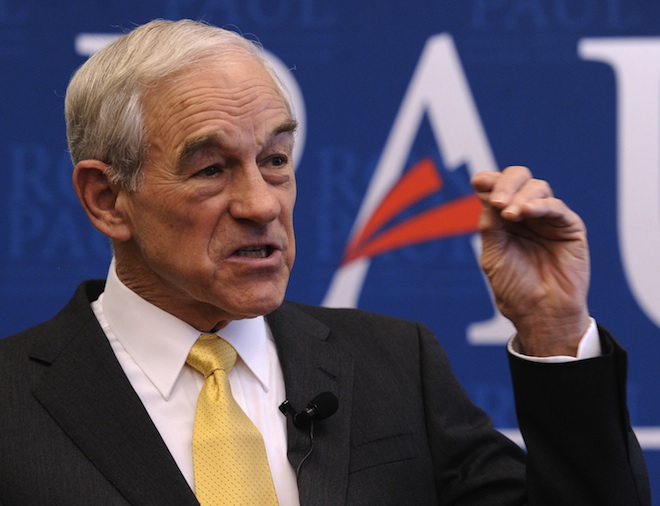The Iowa GOP caucuses, the home field of the social conservative — where former Arkansas Gov. Mike Huckabee turned out the evangelical vote on his way to a victory, and where noted religious activists can be just the endorsement a campaign needs to win the first state in the primary process. In 2008.
The evangelical vote in Iowa this year has been hard to pin down. Or rather, it’s been moving from candidate to candidate during the various surges in the state, mirroring the more general faction of GOP voters that would like to nominate anyone but Mitt Romney. But as the January third caucuses approach, Rep. Ron Paul (R-TX) has moved to the top of the heap…presenting pundits with a problem. The conventional wisdom is that Paul can’t or won’t make a play for those voters — that they are strictly the territory of Christian firebrand candidates Rep. Michele Bachmann (R-MN), Texas Gov. Rick Perry (R), and former Pennsylvania Sen. Rick Santorum (R).
Except, the numbers show evangelical voters haven’t coalesced around any of those candidates. And Paul, who has never actually suffered with this voting bloc, is picking up more and more as he rises to the top in Iowa.
There’s probably no greater example of the relative inability of GOP candidates to gain universal evangelical support than Texas Gov. Rick Perry. With a healthy ad budget, Perry has blanketed the state with spots that are a full bore attempt to sway notoriously fickle Republicans by bringing up divisive social issues, along with edging even further to the right politically, moves catalogued here by TPM’s Evan McMorris-Santoro. The result? A small bump, from the mid single digits to between nine and eleven percent in the latest polling.
In fact, the numbers from the last month show that the trio of Bachmann, Santorum and Perry get a few bonus points from evangelicals, but it’s hard to call it outsized support. The candidate who leads among Iowa evangelicals, according to the new Public Policy Polling numbers in the state? Again, that’d be Rep. Ron Paul (R-TX), who is leading everyone in the Republican trial heat. And when it was Gingrich, evangelicals were for him. It was businessman Herman Cain before that.
But that doesn’t stop some pundits from returning to the easy idea that this is the 2008 Iowa electorate all over again. In a post entitled “No Surprise, Iowa Social Conservatives Are About To Shoot Us All in the Foot Again,” Erik Erickson at RedState opines that a new CNN poll shows former Pennsylvania Sen. Rick Santorum moving to third in the state on the backs of religious voters. It’s true, Santorum gets 16 percent of the total vote, and 22 percent of self-identified born-again Christians. But Paul gets 20 percent of born-agains, Romney gets 16, and Gingrich 14. So there’s no evidence that religious conservatives are bunching up behind a chosen candidate. They’re as diffuse as any demographic in the Iowa GOP numbers.
More generally, the idea that Paul doesn’t resonate with religious voters within the GOP seems to be based on his proud adherence to libertarian tenets. But as TPM has reported, Paul has been making a play for evangelical votes all along, and the move actually may have caused more problems than it was worth.
The latest PPP numbers provide the likely answer to why evangelicals themselves aren’t even going with the candidates that pander to them — only 12 percent of likely Iowa GOP caucus-goers said that the social issues were the most important concern in 2012. 39 percent said cutting the deficit, with 25 saying jobs, for a total of 64 percent of voters more concerned about the economy in some way.
So the Iowa caucuses may again pick a very conservative candidate with little to no chance of actually getting the nod. But this time, it might be a candidate who wants to take out the Federal Reserve, not go to war on gay marriage.









